10 Nov 2023 | Africa, News and features, Tanzania, United Arab Emirates
When Tanzania’s President John Magufuli died in 2021, at the height of the Covid-19 pandemic, many hoped for an end to his six years of autocratic rule which saw the country’s civic space all but disappear. After Samia Hassan succeeded him, she assured the country that his authoritarian practices had died with him. Yet a crackdown on opposition to a lucrative new deal to run Dar es Salaam’s port in perpetuity and restrictions on the use of virtual private networks (VPNs) suggests otherwise.
In her inaugural policy speech after Magufuli’s death, President Hassan said: “I have heard there are media that were banned. Reopen them, we should not give them room to say we are shrinking press freedom. We should not ban the media by force. Reopen them, and we should ensure they follow the rules.”
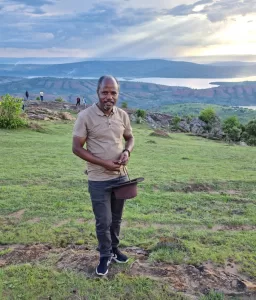
Tanzanian journalist Ansbert Ngurumo fled to Sweden in 2017
One of those who heard Hassan’s promises was the Tanzanian journalist Ansbert Ngurumo (left), who had fled Tanzania in 2017 after getting tipped off that hitmen with orders from Magufuli to kill him had checked into the hotel where he was staying.
Speaking to Index from exile in Sweden, he said: “Journalism became a crime under Magufuli”
The omens looked good after Magufuli’s death. After being sworn into office, President Hassan, the newly celebrated “champion” of freedom of expression, seemed to act promptly on her promises. Human rights organisations, who had had their bank accounts frozen, were once again able to regain access. Onesmo Olengurumwa, director of the Human Rights Defenders Coalition of Tanzania, saw the accounts of his organisation released shortly after her announcement.
Media Council Tanzania reported a decrease in cases of arrests and harassment against journalists. It recorded 18 violations in 2022, down from 25 in 2021 and 41 in 2020. In January 2023, Hassan lifted a ban on opposition party rallies.
Yet Ngurumo says Hassan’s speech was disingenuous. “She was insisting that she was the champion of freedom of expression and free speech, whilst in the same breath putting barriers and limits to those same freedoms. Her freedom of expression is ’you scratch my back, I’ll scratch yours’ That is not freedom of expression.”
The early optimism which followed Hassan’s rise to power was short-lived. Although the number of reported cases against journalists has decreased since Magufuli’s death, suspensions, arrests, and harassment remain commonplace.
In fact, the ghost of Magufuli still hangs over civic space in Tanzania and journalists still feel the weight of the legislation passed and enforced during Magufuli’s presidency. Laws like the 2015 Cybercrimes Act, the 2016 Media Act, and the 2018 Online Content Regulations continue to restrict freedom of expression, and create an environment of fear and self-censorship.
According to Ngurumo, “Magufuli had instilled a sense of brutality in the state organs. That spirit of brutality didn’t die with him.”
More recently, Tanzanian authorities have arrested over 20 activists protesting the most recent deal to manage Dar Es Salaam’s largest port, according to Human Rights Watch. The authorities later arrested three lawyers for holding press conferences on the port deal. Boniface Mwabukusi, Willibrod Slaa and Mdude Nyagali were held on allegations of treason before being released four days later.
The controversial deal will see Dubai Port World, a UAE-based logistics company, take over the management of Tanzania’s largest port in Dar Es Salaam. Critics are concerned by the nature of the deal, which sees DP World gain the right to manage the ports in perpetuity, whilst restricting Tanzania’s ability to change conditions of the contract.
Opposition to the DP deal has been stamped out of Tanzanian media. This most recent crackdown puts Hassan’s promises in a questionable light. Old authoritarian practices have quickly come back to haunt Tanzania at the first real threat to Hassan’s leadership.
For Ngurumo, this was just another sinister message to journalists and activists in Tanzania: “These guys were held but they were released. You see, they are just threats to remind them that the government can still do something.”
Those threats seem to be working. Under constant fear and pressure, mainstream Tanzanian media still shies away from criticising the government.
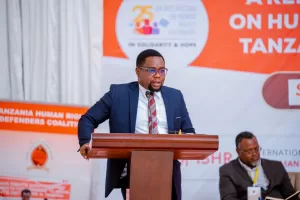
Onesmo Olengurumwa of the Human Rights Defenders Coalition of Tanzania feels that opponents to a deal for Dubai Ports World to take over Dar Es Salaam’s port fear speaking out
Olengurumwa (right) argues that publications “have that hangover and feel like they will be treated as they were under Magufuli if they speak up. So they choose to remain silent, especially the mainstream media”.
From Sweden, Ngurumo still regularly writes about Tanzanian politics in his online newspaper Sauti Kubwa which means “loud voice” in Swahili. He knows that his colleagues in the country do not have the luxury of distance.
“Right now, I don’t see media in Tanzania doing their job. I do not blame them because the laws are still very repressive.”
Ngurumo still believes there is a way out: “If one thing should be done it should be amending the existing laws. We are only afraid of the laws. If we had the right laws, we would just do our job.”
Tanzania’s civic space might be at the mercy of the fickle “goodwill” of their new President, but human rights activists like Ngurumo and Olengurumwa are working hard to restore freedom of expression in their country.
Ngurumo still advocates for engagement with the government from exile. “There is back and forth. We don’t want to have to wait until there is another president.”
In their eyes, change can only happen through engagement with the government and community empowerment. Both are part of organisations pushing for the amendment of the Magufuli laws. Olengurumwa added that “if people can see that our constitution is changing and that laws are being revised, then that will also give them the confidence in our civic space.”
Their fight to reclaim civic space after decades of authoritarianism will be hard fought. On 13 October 2023, the Tanzanian Communication Regulatory Authority issued a statement restricting the use of virtual private networks in the country, much to the dismay of human rights organisations.
In their statement, the Tanzania Digital Rights Coalition condemned the move and argued that it corresponded to “curbing freedom of expression and restricting access to unbiased information.”
It seems authoritarian habits die hard. But if President Hassan is serious about her intentions to restore civic space in Tanzania, it is only by breaking down repressive legislation and building the protection of freedom of expression into the constitution that old ghosts can finally be laid to rest.
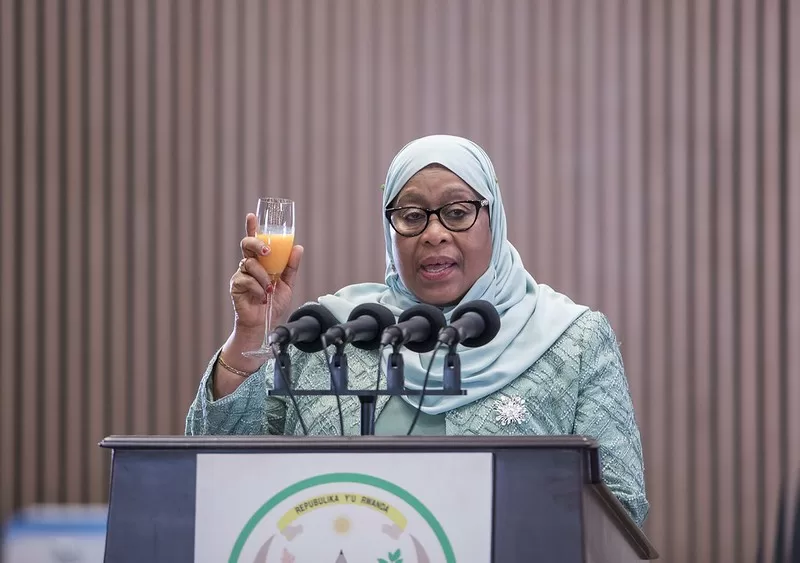
Tanzania’s president Samia Suluhu Hassan in 2021. Photo: Paul Kagame, CC BY-NC-ND 2.0 DEED
25 Nov 2020 | News and features, Tanzania
[vc_row][vc_column][vc_column_text]
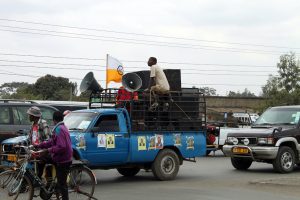
Campaigners at the 2010 election in Tanzania, when voter turnout was higher than today. Credit: flowcomm/Flickr
The 2020 general election in Tanzania is becoming a huge blemish on Tanzanian democracy. Held at the end of last month, the CCM incumbent, John Magufuli, was declared the winner by 84% of the vote, with his biggest opponent Tundu Lissu from Chadema getting only 13% of the vote. The ruling CCM also won by unprecedented numbers seats in the union parliament (over 90%), the Zanzibar house of representatives, as well as ward councillor seats, sending the country to a near single party era.
The main opposition parties, Chadema and ACT Wazalendo, have jointly denounced these results, declaring the entire election process illegitimate, citing rigging of epic proportions including reported but unverified claims of ballot stuffing in multiple constituencies and foul play against opposition candidates. They have also called out human rights abuses during the process, alleging that 14 people have died because of excessive use of force by police in Zanzibar.
Opposition leaders and members in different localities have been unlawfully detained during and after the elections. A call for nationwide peaceful protests seemed to go unanswered by the masses and was met with stern warnings from the police. Some opposition leaders like Lissu were forced to flee the country for their safety.
Instead of finding a path to dialogue and reconciliation that allows the concerns of millions of Tanzanians to be addressed, the government of Tanzania has mostly been dismissive of these allegations.
“Tanzanians want democracy, respect for their basic human rights and dignity,” said Lissu while speaking with Index via Zoom.
Until recently Tanzanians put a lot of trust in the ballot. But amid claims that the National Electoral Commission and Zanzibar Electoral Commission lack independence and therefore credibility to oversee a free and fair election, voter turnout has dropped. The chairs and members of NEC and ZEC are appointed and can be fired by sitting presidents of Tanzania and Zanzibar respectively, who may also be candidates in an election.
“Partiality is built into the Tanzanian system, making rigging a systemic problem,” said Lissu.
“Our minimum demand is for an independent electoral commission and substantial reforms in the electoral system,” he added.
But a systematic overhaul will take time.
Zitto Kabwe, a prominent leader from ACT Wazalendo, told Index, “We need a credible and independent investigation into the 2020 election.” He sees an independent investigation as a more immediate first step to restoring trust that has been eroded in the current regime.
Magufuli may have rightly won this election because of his popularity and ambitious economic agenda, but the process that declared him the winner was marred with allegations of irregularities. Agreeing to such an investigation could help clear these allegations and restore trust.
Opposition leaders like Lissu and Kabwe represent the voice of millions of Tanzanians, yet their speech is often vilified as ill will and unpatriotic. In fact, Tanzanians often treat Lissu much like the world treats women who face abuse: When he was shot many times people blamed him and demanded he produce evidence of his own assault; when he was in the news speaking about his attack, people said he wanted attention, that he was slandering the good name of the country, that he shouldn’t air the country’s dirty laundry. And so we find ourselves in a situation where there has been no proper investigation and no arrests for whoever attacked him.
Intensifying censorship in Tanzania has further tarnished the election. In addition to repressive laws that have mellowed the media, as well as stifled civil society and political parties in the past four years, private phone companies were co-opted into shutting down the internet for millions of people during and after the election.
In this toxic environment, the media has suffered further attacks, especially those who work at foreign media, which is tarnished by the brush of colonialism. Journalists and citizens don’t just suffer from the threats posed by this suppressive regime, they have to navigate how any speak highly critical of the government, and therefore country, might be seen as unpatriotic. The result is self-censorship. Writing negative news about your country is a terrifying act.
“We are in an economic warfare, and Tanzanians aren’t strangers to imperialism,” said Wilbrod Slaa, a disillusioned former Chadema secretary general and 2005 and 2010 presidential candidate. There is a mistrust of international involvement.
“What would speaking out do for the country?” several people who didn’t wish to be named asked Index.
But of course democracy demands free speech to be truly free.
“Tanzania has a history of solving its own problems. I wish the government would hear us and come to the table for dialogue and consensus and avoid extreme measures like sanctions,” said Ado Shaibu, Secretary-General of ACT Wazalendo. “We can’t afford to become another Zimbabwe,” Shaibu added.
Tanzania must end its war on dissent. Tanzanians deserve that much.[/vc_column_text][/vc_column][/vc_row]
23 Oct 2020 | Africa, News and features, Tanzania
[vc_row][vc_column][vc_single_image image=”115317″ img_size=”full” add_caption=”yes”][vc_column_text]On 28 October, Tanzania goes to the polls. The election will see the Tanzanian people choose a new president, members of parliaments for the mainland as well as Zanzibar and local councillors.
If the elections are free and fair, there is no reason to believe that the incumbent president John Magufuli will not be returned to power. He has a commanding lead in the opinion polls – independent surveys say that 80 per cent of people on the mainland and 71 per cent in Zanzibar are going to vote for him.
Magufuli came to power in 2015, promising to reduce government corruption and spending. He also vowed to increase investment in the country’s industries. He represents the Chama Cha Mapinduzi (CCM) party that has been in power ever since 1961 when the country gained independence from Britain.
Since his election, Magufuli has been seen to be tough on corruption, particularly related to the mining sector which generates significant incomes for the country.
In 2017, Magufuli presented London-based Acacia with a US$190 billion bill for back tax related to metallic ores exported from the country. The company denied any wrongdoing but its Canadian parent opted to pay the country US$300 million to settle the claims and agreed to share the economic benefits more equitably.
There is also a feeling that Magufuli has handled the Covid pandemic well, although many believe that the country’s statistics do not tell the real story.
At a church service in June, Magufuli claimed that coronavirus had been “removed by the powers of God”.
The number of cases in the country has been stuck at 509 for weeks though that has more to do with the country not releasing official statistics rather than the virus being defeated. Opposition figures claim the true figure is in the tens of thousands and that hundreds have died.
The president clearly has no confidence in the country’s testing regime. Earlier this year he suspended the head of the country’s national health laboratory in charge of coronavirus testing after it was claimed that secret tests carried out on animals, fruits and vehicle oil at the laboratory had tested positive for Covid.
“People genuinely believe he has handled Covid well,” said one person who has had close political and business links with Tanzania for more than 30 years, speaking on condition of anonymity. “His view has been that people in Tanzania would suffer much more from having a lockdown rather than having a few cases and people been getting on with life as normal.”
Part of this may be due to the fact that Tanzania is relatively young – just 3.8 per cent of the country’s 60 million population are aged 65 or over and more likely to die from the disease.
“When infections were higher back in May, people did a lot of traditional remedies, and there was a lot of reliance on local knowledge then, and prayer, and then when things got better people relaxed a bit more,” says Tanzanian poet and writer Neema Komba.
The presence of mass crowds at political gatherings, usually without masks, is perhaps a sign that Covid is no longer considered a serious risk in the country, whatever the truth is about a virus that has killed more than a million people worldwide.
She says that Tanzanians are very aware of individual responsibility.
“There is a saying in Swahili that really reflects the attitude – ‘za kuambiwa changanya na za kwako’ – which means something like what you are told you should analyse on your own”.
Tanzania’s economy is not doing too badly either.
In the 1980s, it was one of the poorest countries in the world. In the middle of that decade, the country embarked on a liberalisation programme under President Ali Hassan Mwinyi which removed price controls, reduced the budget deficit and restructured many of the country’s state-owned enterprises. It has now jumped above many of its fellow African nations in terms of GDP, averaging growth of more than six per cent every year since 2000. This year, growth may fall to between 1.9 and 4 per cent.
The influential businessman with political connections who spoke to Index said, “Magufuli will win this easily. He has a lot of support from people who are fed up with inequalities and fed up with greed that some politicians have shown in the past. The Tanzanian people believe he is generally on their side and that those who are barred form standing have probably got it coming to them.”
Yet the key question is still, will the elections be free and fair?
Magufuli himself vowed in January that the elections would be free and fair but opposition politicians are not convinced. The main opposition party Chadema (Party for Democracy and Progress) has had hundreds of its candidates for parliament and councils disqualified.
Chadema presidential candidate Tundu Lissu was prevented from campaigning for seven days in early October by the NEC for allegedly contravening election rules while Zanzibar’s commission suspended campaigning by ACT Wazalendo candidate Maalim Seif.
Both have been accused of using ‘seditious’ or ‘inciting’ language and some feel that it is only opposition candidates that are picked up on this.
NEC director Dr Wilson Mahera told Tanzania’s Daily News that candidates needed to follow the regulations.
“A leader who continues causing public fears, uttering seditious words may find himself/herself out of the list of candidates before polling date,” said Dr Mahera.
There is a changing mood in the country relating to the media.
The country has typically done well on RSF’s World Press Freedom Index compared to many of its near neighbours. The media has generally been free in the country, particularly under Benjamin Mkapa who ruled the country from 1995 to 2005. Mkapa worked as managing editor of a number of newspapers in the country in the mid-60s to early 70s before starting his political career as press secretary under Julius Nyerere, who took Tanzania to independence.
However, this year the government has tightened up laws which bars Tanzanian broadcasters from airing national or international content on their platforms without prior permission from the government
In June, the government withdrew the licence of newspaper Tanzania Daima for “extreme and repetitive” offences that violate the country’s laws and journalistic ethics.
In July, the government began a crackdown on the use of social media. The Electronic and Postal Communications (Online Content) Regulations 2020 bans “news, statements or rumours for the purpose of ridicule, abuse or harming the reputation, prestige or status of the United Republic, the flag of the United Republic, the national anthem or the United Republic’s symbol, national anthem or its logos”.
“Social media is an interesting space,” says Komba. “I would say there are various Tanzanias on social media but then perhaps it is about the algorithms that show you what you want to see. From my observations, if you are on Twitter, you will get more political discussions, while Facebook and Instagram are completely different and then you have spaces like Jamii forums where people voice their opinions more boldly and WhatsApp where people have more private discussions.”
She added, “The cybercrime act has made it quite challenging for people to freely express themselves. So, perhaps we need to ask ourselves, what aren’t people saying?”
Magufuli has been tough on corruption in the mining sector which has given him popular appeal.
Despite this crackdown, Komba says there seem to be positive steps to make the elections freer than in the past.
“Tanzania has invited international observers and we hope that these observers will give us the answers about the fairness and freeness of the elections, but unfortunately, we only get this information after elections are done. The National Electoral Commission has also allowed the use of alternate IDs in case of voter ID loss, which is also something positive. And, there is still voter education given by various stakeholders.”
Our interviewee said, “Magufuli could easily be re-elected in an completely open and transparent way but people in the CCM are paranoid about the opposition. The concept of a loyal opposition is not one that is deeply embedded.”
If Magufuli wins re-election for a second term – as all of his predecessors since independence have done – then the question is what next? Will he attempt to change the constitution so that he could remain in power as others have done elsewhere in the world?
He added: “I am pretty sure that even if he wanted to, there are enough ambitious and powerful people in the CCM who want their turn at the presidency.”
[/vc_column_text][three_column_post title=”You might also like to read” category_id=”540″][/vc_column][/vc_row]
1 Oct 2019 | Campaigns -- Featured, Media Freedom, Statements, Tanzania
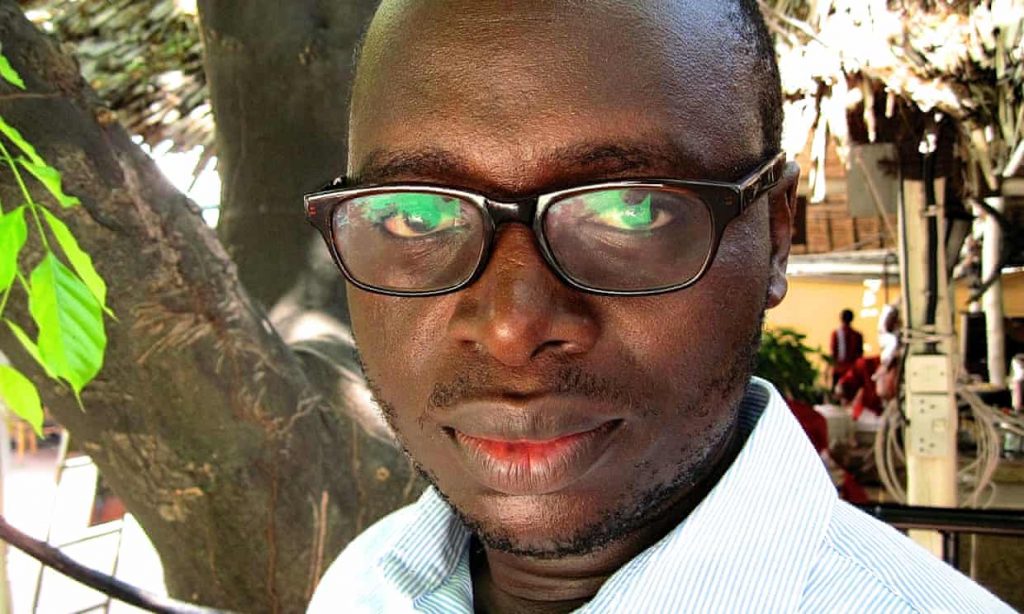
Journalist Erick Kabendera
Index on Censorship has urged authorities in Tanzania to release journalist Erick Kabendera, who faces charges of money laundering and involvement in organised crime.
Kabendera, who wrote for Index on Censorship magazine in 2014 on the risks faced by journalists working in Tanzania, faces up to five years in jail without trial because of the nature of the charges. He has already been imprisoned for more than two months awaiting trial. His case has now been postponed for the sixth time.
“Index is extremely concerned about Erick Kabendera’s health and at the growing threats to media in Tanzania,” said Jodie Ginsberg, Index on Censorship chief executive. “We call on the authorities to drop these charges, which appear to have been concocted to punish Erick Kabendera for his investigative reporting.”
Kabendera’s lawyer Jebra Kambole has now called on President John Magufuli to pardon him as a court last week postponed a hearing into his case for a sixth time. Kabendera’s lawyers called for the process to move forward given that their client was being held on charges that are not bailable, said African newspaper Doberre.
According to The Guardian newspaper, the “accusations against Kabendera changed several times, ranging from claims that he was not a Tanzanian national to sedition under cybercrime laws, before the police settled on economic crimes.”
Since being detained, his health has deteriorated, although he is now receiving medical treatment.
The UK and the US have said they are “deeply concerned about the steady erosion of due process in Tanzania” and highlighted Kabendera’s case. The UK is the largest provider of foreign direct investment to Tanzania, including a project supporting quality journalism in the country. The UK’s Foreign Office has made media freedom its main campaign of 2019.
In 2014, Kabendera wrote in Index about how his elderly parents had been arrested by authorities who asked them “to tell me to “be careful with stories”.





